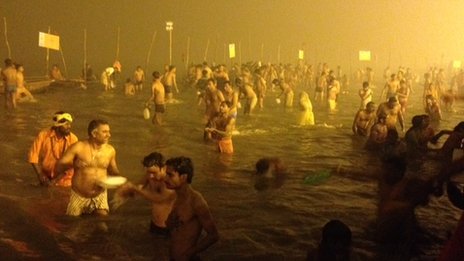KUMBH MELA BEGINS IN ALLAHABAD

BATHERS TAKING A HOLY DIP BEFORE DAWN

MT NEWS: Millions of Hindu pilgrims have arrived in the Indian city of Allahabad as the Kumbh Mela festival gets underway.
On Monday thousands began bathing at the point where the Ganges and Yamuna rivers converge, with up to ten million more set to do so over the coming days.
The event, which takes place once every 12 years, is billed as the biggest gathering of humanity on Earth.
During the 55-day festival more than 100 million people are expected to visit the city.
In 2001, more than 40 million people gathered on the main bathing day of the festival, breaking a record for the biggest human gathering.
Hindus believe that taking a dip during the festival will rid them of their sins and help them achieve salvation.
Huge camps
Allahabad has been preparing for the festival for months and a vast tented city has grown up around the river.
Fourteen temporary hospitals have been set up with 243 doctors deployed round-the-clock, and more than 40,000 toilets have been built for the pilgrims.
Police checkpoints have been set up on all roads leading to Allahabad and about 30,000 policemen and security officials have been deployed to provide security during the festival.
By Sunday night, tens of thousands of men, women and children had set up camp on the white sands of the river front.
Smoke could be seen rising from hundreds of small fires which people had built to cook dinner or keep warm.
The main attraction at the festival is the Sadhus – Hindu holy men – who have been leading processions accompanied by elephants, camels, horses, chariots and music bands in recent days.
Health concerns
The festival formally started at dawn on Monday with groups of naked ash-smeared Sadhus sprinting into the chilly waters at Sangam – the point at which the rivers converge – followed by millions of other pilgrims.
With massive crowds expected, many pilgrims chose instead to bathe in the river over the weekend, performing rituals, praying and floating little paper or leaf boats.
The festival has prompted health concerns, however, with campaigners warning that the river waters are heavily polluted.
Most pilgrims drink a few drops of the Ganges water and many fill bottles to take home with them.
Authorities say they have taken steps to address the concerns.
Last week, companies along the banks of the Ganges and Yamuna were warned against discharging any pollutants into the waters.
Reservoirs upstream have been ordered to discharge fresh water into the rivers ahead of the six big bathing days, and the festival authorities have declared the Kumbh Mela area a plastic-free zone.
The Kumbh Mela, which is costing the authorities 11.5bn rupees ($210m; £130m) to organise, is expected to generate businesses of at least 120bn rupees, according to a report by industry association The Associated Chambers of Commerce and Industry (Assocham).
The report says that the festival is expected to draw over a million foreign tourists too.
The Kumbh Mela has its origins in Hindu mythology – many believe that when gods and demons fought over a pitcher of nectar, a few drops fell in the cities of Allahabad, Nasik, Ujjain and Haridwar – the four places where the Kumbh festival has been held for centuries.




